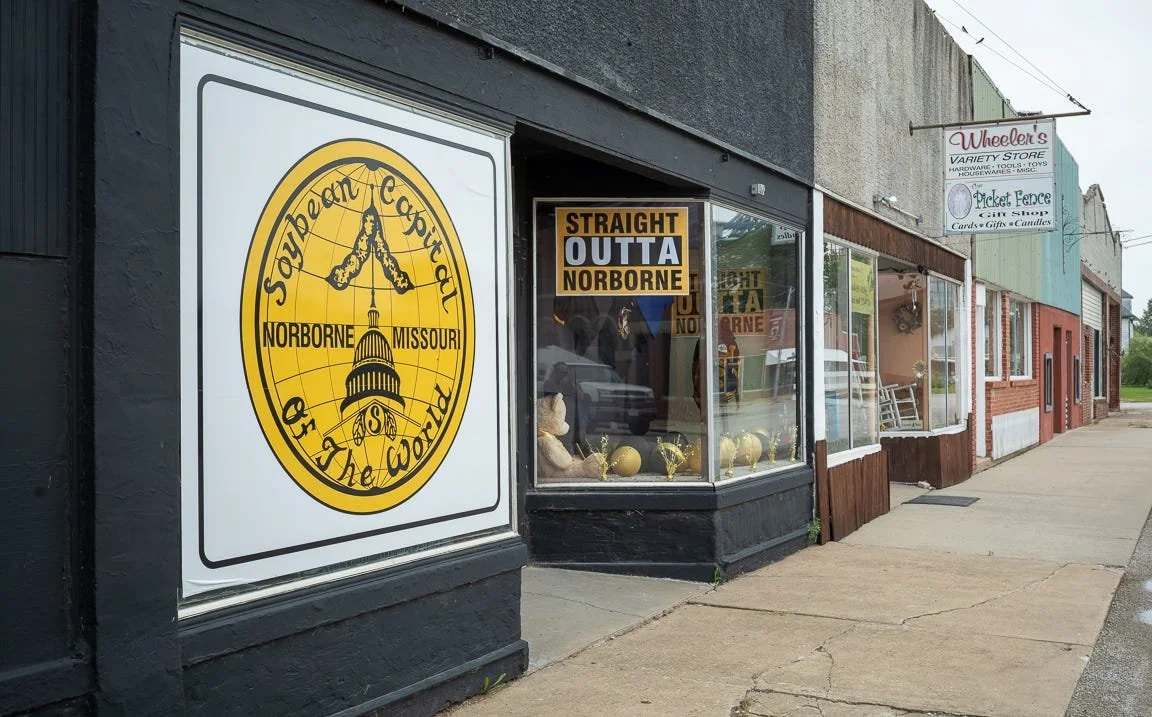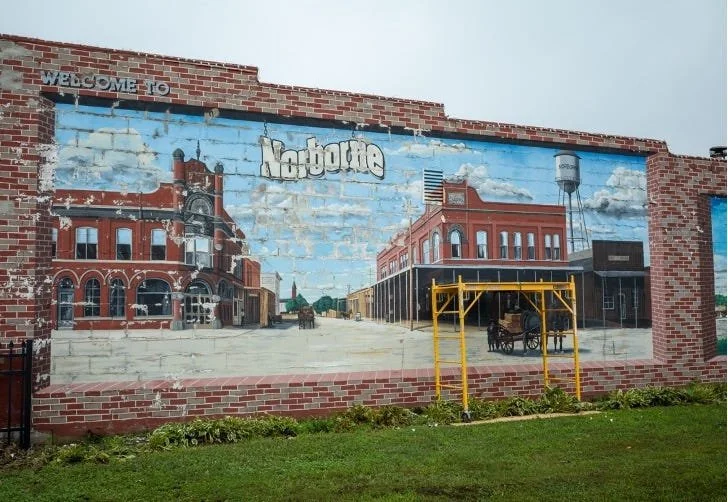Soybeans steal the spotlight at Missouri Festival, showcasing their role in thousands of products

Surrounded by fields of soybeans stretching for miles in every direction, the city of Norborne in Carrol County, Missouri, considers itself the "Soybean Capitol of the World."
That's a heady claim, knowing that states like Illinois and Iowa routinely produce the most soybeans in the U.S. But, if you drive south out of town to County Road 109 and the intersection of Missouri Highway 10W, you will see soybean fields for miles in every direction, helping to understand why in 1982, city leaders declared their soybean prominence and started a new festival.
Every August for the past 41 years, the town celebrates its soybean lineage by throwing the Norborne Soybean Festival, complete with live entertainment and family games – centered around the Soybean Patch — a large covered outdoor community center that doubles as a beer garden for the festival.
"Back in the beginning, they would bring in their soybeans, and they would have a competition for the longest bean plant and the one with the most pods," Pam Penrod, an employee with the City of Norborne, says. "They gave out awards, and they would hang them up on the side of the building up there to see who would have the most beans in the pods and different things like that."
If you still aren't convinced of Norborne being the "Soybean Capitol of the World," a look at the state agriculture data shows that agriculture produces almost 50% of the economic output of Carroll County and is the source of nearly half of all household incomes.
Thanks to the soybean checkoff and the hardworking farmers surrounding Norborne, soybean utilization and research continue to expand the demand for protein-rich oil seed.
Today, there are many uses for soybeans grown in Carrol County, Missouri and across the U.S. As a partner, the United Soybean Board remains committed to its work supporting the research, development, and expansion of soy in new products. The more than 1,000 soy-based products available — everything from machinery lubricants to asphalt to shoes — help drive demand for U.S. soy.
"The soybean industry is constantly evolving and finding new ways to use this versatile crop," Meagan Kaiser, Chair of the United Soybean Board and Missouri farmer, says. "The soybeans we grow on our farm have more and more uses from the roads we drive on to the soles of our shoes. There are thousands of uses, and new exciting applications are being developed daily."
Soy Asphalt
As the parade weaved its way through Norborne's annual soybean festival, few spectators realized the asphalt beneath their feet, a familiar cornerstone of American infrastructure, was on the cusp of a soybean revolution. Researchers have recently developed a unique asphalt formula utilizing bio-polymers derived from soybean oil. With over 4 million miles of paved roads crisscrossing the United States, the need for asphalt upkeep is a constant, offering myriad opportunities for high oleic soybean oil and soy-based asphalt to make their mark.
Not only does this innovative polymer offer a cost-effective alternative to traditional petroleum-based binding agents, but it also boasts less volatility and a cleaner environmental footprint. Yet, the benefits continue beyond there. Soybean oil also significantly increases the reuse rate of asphalt grindings. According to data from the United Soybean Board (USB), soybean oil can boost the recycling rate from a modest 17% to an impressive 30%. Norborne's soybeans will likely continue to shine on the national stage for many years.
Goodyear Tires
The tires transporting some of the approximately 500 festivalgoers to Norborne yearly were made with soybean oil. This integration of agriculture and technology is primarily due to the strategic partnership between the USB and Goodyear. Farmer leader checkoff funds are pivotal in fueling Goodyear's innovative research and development and spreading the word to major fleets about the remarkable benefits of incorporating U.S. Soy into tire production.
Goodyear announced in October 2019 plans to ramp up their soybean oil usage by 25% in 2020. Even more impressively, they have set a bold target to completely supplant their petroleum usage with soybean oil by 2040. This is a testament to the versatile power of soybeans grown in the fertile fields surrounding Norborne.
Sketcher Shoes
It's fascinating that some festivalgoers may have been celebrating the soybean in a way they didn't even realize - through their Sketchers footwear. The famous shoe company has incorporated soybean oil into its soles, a nod to sustainability and a testament to the versatility of the soybean crop. Sketchers plans to expand this innovative technology across a broader range of styles and hues, offering consumers a renewable product option. This benefits environmentally conscious shoppers and opens up new market opportunities for hardworking farmers in Norborne and nationwide.
Food and fun
Imagine a festival without the enticing aroma of food wafting through the air. Unthinkable, right? That's certainly not the case at the Norborne Soybean Festival. Here, your taste buds are treated to a delightful array of dishes, many fried in nutritious soybean oil. The star of the show? None other than the renowned Missouri soybean donuts. But that's not all. The Missouri Soybean Merchandising Council (MSMC) also generously supplied the soybean oil used in the much-anticipated fish fry, and the pork chops were powered by soybean meal.
Sustainable airline travel
The skies above Norborne, Missouri, might soon be humming with the power of local soybeans. The very planes crisscrossing the sky, journeying to countless destinations, could be fueled by millions of bushels of home-grown soybeans. This isn't a far-fetched dream; it's the prospective reality of Sustainable Aviation Fuel (SAF), a cleaner alternative to traditional aviation fossil fuels.
SAF is on the cusp of sparking an unprecedented demand for soybeans and other feedstock. And who's at the vanguard of this green revolution? The soy checkoff tirelessly funds research and promotional efforts to ensure U.S. soybeans remain a premier feedstock supplier for this sustainable fuel. The future is not just green - it's soybean green.
Looking at the mural that paints a vivid history of Norborne, you can't help but wonder what the future holds for the Soybean Capitol of the World. As the mural gets a fresh coat of paint, most likely made with soybean oil, new important uses are being developed for the soybeans grown here. Sustainable soybean oil and meal continue to be an essential driver of the economy in the area.
For more than two decades, Joseph L. Murphy has had the pleasure of meeting and connecting with people from all walks of life through photography. He has photographed presidents and heads of state, traversed the winding alleyways of the Fes Medina in Morocco, photographed the sprawling countryside and people that make up Argentina and covered events that have defined the U.S. Most recently, Murphy’s travels have taken him to Cambodia, Mexico, China, Vietnam and Ecuador.
He has spent the past 20 years specializing in agriculture photography for multiple organizations, publications and marketing projects.
A graduate of the University of Iowa, Murphy determined at an early age that his love of photography would shape his vision for life.

